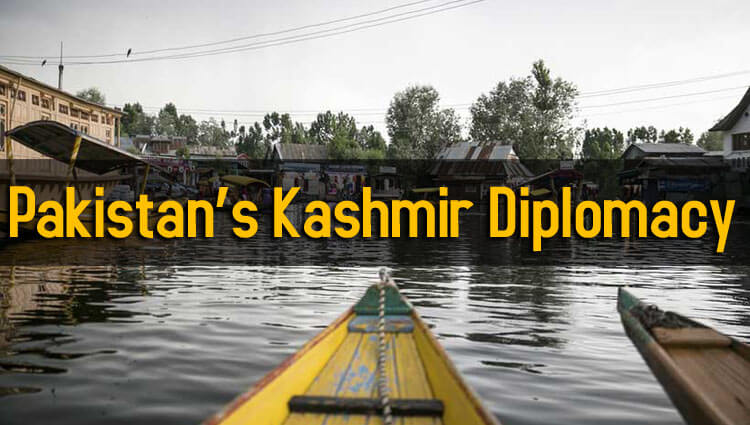By: Khurram Minhas
On August 5, 2019, the Modi-led BJP government wiped out the special status of Indian Occupied Jammu & Kashmir (IoJ&K). During this year, Pakistan’s diplomatic manoeuvring was effective, calculated and rational, which has been widely acknowledged by the international diplomatic community. Islamabad suspended its diplomatic and trade relationship with India. The Kashmir dispute was, after a long time, discussed at the United Nations Security Council (UNSC) after almost five decades due to Pakistan’s diplomatic efforts and with Chinese assistance. Prime Minister Imran Khan’s speech at the UN General Assembly session has been categorised as one of the most persuasive speeches where he declared himself as the ambassador of Kashmir.
In November 2019, Pakistan opened the Kartarpur Corridor which is an explicit gesture by Pakistan to restart bilateral dialogue on the Kashmir dispute with India. A few weeks ago, a similar kind of goodwill gesture was shown by resuming the Afghan Transit Trade, allowing the Afghan government to send its goods to India. However, the ultra-nationalist BJP government has shown no positive gesture to Pakistan’ diplomatic efforts of resuming dialogue. It seems BJP has considered Pakistan’s goodwill gestures as its weakness.
Pakistan has tried every possible approach to resolve the dispute, even before the August 5 disaster. In international conflict resolution, scholars have identified two different approaches; both bottom-up and top-down, to resolve any territorial dispute between the two countries. Firstly, in case of the bottom-up approach, Pakistan tried to solve smaller political issues with India so that a conducive environment could be created for the resolution of the Kashmir dispute. Secondly, Pakistan also tried the top-down approach to solve the larger political issue, i.e., the Kashmir dispute, but all efforts went in vain. At Tashkent, which was a multilateral approach and Simla, which was a bilateral approach, Pakistan adopted a step-by-step strategy. Later, Rajiv Gandhi and General Ziaul Haq agreed in 1985 to start a comprehensive dialogue on four subjects, i.e. Siachen, Sir Creek, trade relations and issues related to terrorism and people-to-people contacts. Progress was achieved on all these issues, but unfortunately, when the dispute of Kashmir was raised by Pakistan to India in 1990, New Delhi refused to discuss it and the dialogue process came to an end.
In 1997, Indian Prime Minister I.K Gujral and Prime Minister of Pakistan, Nawaz Sharif agreed to hold dialogues on eight bilateral issues including Kashmir. However, the nuclear tests of May 1998 blocked the process. Pakistan started the dialogue process again in 2004 when Kashmir was discussed at the foreign secretaries’ level. Several Confidence Building Measures (CBMs) were agreed upon. Musharraf’s four-point formula was also discussed, but the Mumbai incident in 2008 again halted the process.
The government of PML-N took a step-by-step approach in 2014 once more. Despite all internal political criticism, Nawaz Sharif visited India and tried to restart the stalled dialogue process. However, India did not reciprocate with a positive response. In response to Pakistan’s will to restart the stalled dialogue process, India has always tried to link Pakistan with terrorism. Due to the geo-strategic situation of the region and the vast Indian market, the West has turned a blind eye towards Indian atrocities in IoJ&K. It is disturbing that on the one hand, India has continued human rights violations in IoJ&K and on the other, it has waged a well-organised propaganda for the international isolation of Pakistan.
The future of bilateral relations will remain bleak until India agrees upon two points, i.e., to reverse its unilateral decision of August 5 and start a comprehensive dialogue on all outstanding issues including the Kashmir dispute. Until then, Pakistan’s relations with India will likely remain frozen for the foreseeable future. Meanwhile, Pakistan’s priority should be to keep the Kashmir dispute alive on international forums. Pakistan should not be apologetic and highlight Indian atrocities in IoJ&K. Pakistan should also highlight Indian subversive activities in Balochistan and other parts of the country. Lastly, Pakistan should keep its focus on completion of China-Pakistan Economic Corridor (CPEC) and on strengthening relations with Gulf countries, Russia, Afghanistan and Iran to minimise the Indian desire of Pakistan’s isolation in the world.
Courtesy: Daily Nation







